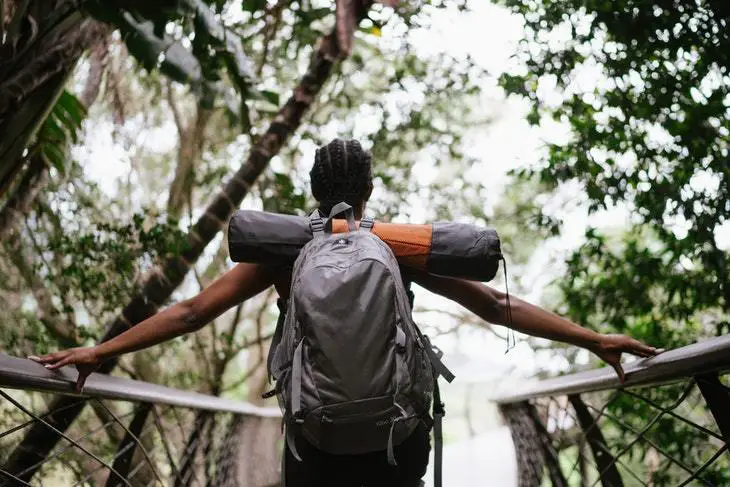How Much Should Hiking Backpack Weigh? (Body-To-Pack Weight Ratio)
Many different factors will affect your hiking experience; the weather, the trail you follow, whereabouts in the area you are. One important thing that you should always take into consideration is the weight you're carrying, and you should always make sure your hiking backpack is right for your needs.
How do you determine what the right weight is to carry? Fear not! Below, we will explore just how much should hiking backpack weigh and what will be suitable for your needs.
How Much Do Hiking Backpacks Weigh? (Just The Bag)
Depending on the type of backpack and its material, the weight won’t be any more than 6 pounds. Of course, this will vary on the make and how many compartments it has.
The weight of your backpack will ultimately be determined by its capacity. If it’s designed to carry more, then it will have a higher weight. Below are some examples of base weights:
6-10 Liter | Average 2lbs, between 1-2lbs |
10-30 Liter | 1-3lbs |
30-50 Liter | 2-5lbs |
50-100 Liter | 3-6lbs |
We can safely assume that your backpack won’t be greater than 6 pounds. If you’re going for a roomier backpack, you should take this into consideration when you’re packing extra items, as you’ll be lugging them about all day.

How Much Should A Hiking Backpack Weigh? (With Gear)
Thinking about hiking, you’re going to be carrying an average of 30-50lbs up mountains and through trails. The amount your hiking backpack should weigh is determined by your own capability.
A lot of different people will tell you not to carry more than 20% of your own body weight. But this is a vague rule to follow, especially if you can carry more than that. Assuming that this rule is textbook, if you weigh approximately 150 pounds, you’ll carry 30 pounds with you.
That’s a decent number to follow, but it doesn’t consider someone who may weigh more or can’t carry as much. Always determine how much weight to carry based on your own capabilities; don’t carry too much if you can’t.
Bodyweight vs Backpack Weight Ratio
Let’s assume the 20% rule is the maximum capacity. We can divide different categories of carrying weight based on the percentage.
In this instance, we can determine how much you should be carrying. A daypack would be for a day hike, but you'll need a full backpack for longer trips. Below are some weight examples:
Bodyweight (LBS) | Heavyweight LBS (20%) | Moderate LBS (15%) | Lightweight LBS (10%) |
|---|---|---|---|
100 | 20 | 15 | 10 |
125 | 25 | 18.75 | 12.5 |
150 | 30 | 22.5 | 15 |
200 | 40 | 30 | 20 |
225 | 45 | 33.75 | 22.5 |
250 | 50 | 37.5 | 25 |
Deciding how much to carry shouldn't just be based on your own weight. It would be best if you considered your own ability, too. Take some serious time before preparing to determine what you're comfortable carrying.
What Impacts The Weight Of Your Hiking Backpack
Different factors are going to affect your hiking. It’s important to carry light because of the impacts of different trails and the elements you’ll be up against. Consider these things before planning your trip:
Duration
Consider the length of your hike or how many days you’re going. A longer trip will require more, and shorter day hikes will require less packing. If you’re going on a longer hike, using the 20% rule may come in handy. You should be mindful of what gear you choose when packing for a longer trip.
Base Weight
It’s accepted that base weight is everything in your bag minus food and water as they are variable factors. As your trip goes on, food will deplete, which means less to carry.
If your base weight is too high, then when you replenish food and water, the extra weight will affect your back.
Food/Water
An essential of any trip. Consider how much water you’re going to need and how to pack it; if it’s a long trip with long desert stretches, you’ll need a lot more water than usual.
It’s important not to skip meals during hiking, because of the strain and exercise on your body. Think about what food you’re able to carry and what will be easiest to prepare.
Weather
Weather is going to affect your hike in both good and bad ways. If it’s during the colder months, this will impact the weight with warmer clothes.
Making sure your bag is waterproof is a must; the rain will destroy anything inside your bag if it’s unprotected. You need to be prepared for the elements.
Personal Preference
Some hikers enjoy one luxury item, and others will prefer to carry only the bare essentials. It’s completely up to you; would you rather carry only what you absolutely need, or will you need to have some luxuries with you? Consider this when you are calculating your base weight.

Overpacking & Under-Packing: Common Issues For Hikers
Most newbies will tend to throw in everything they think they’ll need to hike. Halfway down the trail, they’ll realize the error they’ve made.
When packing, you need to think about items that you absolutely will need and use. You can invest in ultralight gear to keep down your weight. Tents and sleeping bags can weigh next to nothing and will save you space. Water is an essential, but you can also save space by investing in a portable water filter or a backpack with a hydration sleeve.
Under-packing will also affect newbies who pass on some essentials. Your minimum for survival comes down to water, calories, and protection: shelter from the weather and seasonal clothes. Anything else will come under wants over needs.

People Also Ask (FAQs)
How much should your backpack weigh on the Appalachian Trail?
For beginners of the Appalachian Trail, the base weight is usually 20lbs plus/minus 5. You don’t want to pack light or moderate here and should prepare for every scenario. Because of its length, you’re going to need a backpack that will carry all the essentials you’ll need, plus be lightweight and durable.
How heavy should a sleeping bag be for backpacking?
Depending on your abilities, you should aim for a sleeping bag or comforter to be 3-5 pounds. This will vary based on personal preference or scenarios, but it's best to carry one that'll take the least amount of weight away. You can learn how to pack a sleeping bag in our handy guide.
Is a 5lbs tent too heavy for backpacking?
It depends – a 5–6 pound tent could weigh you down, but for a shorter trail, it might be ideal. For a longer or more intense hike, you should aim for a tent weighing no more than 3-4 pounds. Check out our guide on how to carry a tent while backpacking.
How much water do you need per day for hiking?
A good rule of thumb is half a liter of water per hour of moderate activity. Water is a variable weight in your backpack, and your needs will increase or decrease based on the trail and weather conditions.
What are the best snacks for hiking?
Foods with high protein and energy will be your friend. Peanut butter and bananas are common examples. You can also take granola, fruit and vegetables, beef jerky, or nuts and seeds. You want food that will keep your calories up.
Conclusion
Whether you're a first timer or a seasoned hiker, knowing your limits and abilities is vital. Having considered how much should hiking backpack weigh, we can safely decide what essentials are important and what we can avoid taking.
Hiking should be a fun experience, and carrying the right amount of weight will help you enjoy your time more. Stay safe and stay hydrated!
